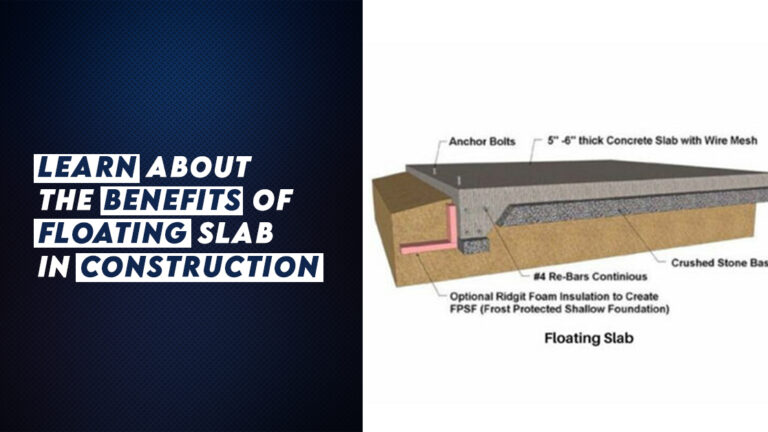The floating slab is a preferred solution in the construction industry for regions with high water or shrink-swell soils. Primarily, the building contractors in Chennai or other parts incorporate slabs that extend to the bedrock or frontline. However, floating slabs directly extend to the ground, reinforced with steel. Hence, this blog explores the benefits of floating slabs in construction significantly.
Purpose Of Floating Slab
As mentioned earlier, some regions’ soil expands over time, impacting the structure’s integrity. Hence, incorporating floating slabs into the structure allows the building to float over the ground without affecting the soil’s shrinkness. In addition, these types of slabs are commonly used based on the soil’s characteristics, and its challenges. Floating slabs are often used for residential buildings, garages, or small structures where a full basement or deep foundation may need to be revised or more practical.
Benefits Of Using Floating Slab
Moisture Infiltration:
One of the foremost benefits of including floating slabs in the construction by the best house construction companies in Chennai like Sathvik is that they are moisture-infiltrated, which is an excellent barrier in preventing moisture from entering the slab. They act as a barrier between the ground and the building by preventing water, frost, and other moisture-related damage. Hence, it maintains optimal structural integrity, extending the building’s life span. Also, as these foundations lay directly over the ground, they reduce the risk of water moisture over time.
Weight Distribution:
The floating slab exhibits the spreading property, effectively distributing vertical loads or stresses across a larger surface area. This characteristic enables the slab to mitigate the impact of such loads and stresses by diffusing them over a broader region, contributing to the stability and resilience of the overall construction.
Space Extension:
A floating slab is ideal for home extensions, acting as a protective barrier between the structure and the ground. This barrier effectively prevents issues like water infiltration and frost damage. Consequently, floating slabs find extensive use in construction projects in cold climates, where their design helps mitigate the impact of freezing conditions on the foundation and superstructure.
Economical Construction:
Utilizing a floating slab in construction offers economic and ecological benefits by reducing the need for extensive concrete and formwork. This foundation type minimizes material usage, optimizing cost-effectiveness and promoting sustainability in building practices. With a floating slab, construction projects can achieve a more resource-efficient balance, as the design doesn’t necessitate the substantial concrete volumes and complex formwork associated with traditional foundations. This approach aligns with environmentally conscious construction methods, emphasizing a reduced environmental footprint. Consequently, using floating slabs contributes to cost savings and a more environmentally sustainable construction process.
The benefits of floating slabs in construction are multifaceted. From addressing soil challenges to providing practical moisture barriers, weight distribution, and economic advantages, floating slabs offer a versatile and sustainable foundation solution. Hence, approach Sathvik, the best builders in Velachery for effective construction approaches, enhancing construction resilience while promoting cost-effective and eco-friendly building practices.








